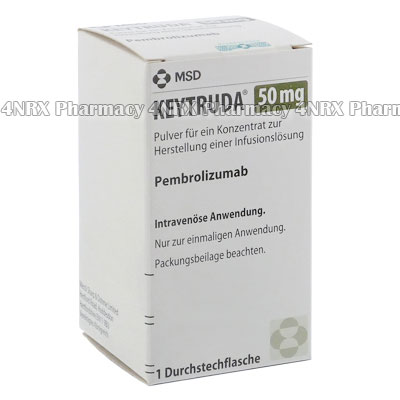 |
Home  Cancer Cancer  Keytruda (Pembrolizumab) Keytruda (Pembrolizumab) |
|
|||||||||
|
|
Keytruda (Pembrolizumab)
What is Keytruda (Pembrolizumab) used for? Keytruda (Pembrolizumab) is used to treat lung cancer or skin cancer where other treatments or surgery are unable to help. How should I use Keytruda (Pembrolizumab)? Keytruda (Pembrolizumab) can be used to treat certain types of lung cancer. It can be used when the cancer has spread AND it tests positive for PD-L1 AND platinum-containing chemotherapy has been tried and failed AND if the tumor has EGFR or ALK gene and you have tried an EGFR or ALK inhibitor medicine without success. Keytruda (Pembrolizumab) can be used to treat skin cancer in certain conditions. It should be used when the melanoma has spread and cannot be surgically removed AND ipilimumab treatment is unsuccessful AND if the tumor has an abnormal BRAF gene and you have tried a BRAF inhibitor medicine. What are the side effects of Keytruda (Pembrolizumab)? The most common side effects of Keytruda (Pembrolizumab) are tiredness, coughing, nausea, itchiness, rash, shortness of breath, reduce appetite, constipation or diarrhea, and joint pain. These are usually mild and will pass. Damage to other organs can cause more serious side effects. If you notice any of the following, contact your doctor immediately:
Please Note Keytruda works by triggering your immune system to fight cancer cells. As an unwanted side effect, sometimes the immune system will also attack healthy organs and tissues which can result in problems in the lungs, intestine, liver, kidney, hormone gland or other organs. If you have Crohn's disease, ulcerative colitis or lupus you may not be a suitable candidate for treatment with Keytruda. If you have had an organ transplant, make sure your doctor is aware of this before beginning treatment. Keytruda (Pembrolizumab) can cause problems within unborn babies. Don not use Keytruda while pregnant and use contraception when taking Keytruda and immediately afterwards. Keytruda may be passed to nursing infants through breast milk. 
|
||||||||||||||||||||||